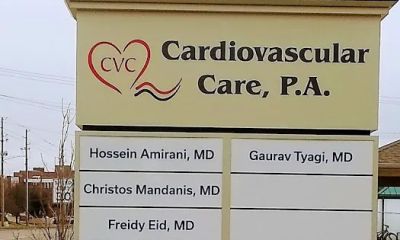How Your Cardiologist Can Help You Manage Hypertension: Expert Care for Your Heart
- 1. Understanding Hypertension and Its Risks
- 2. The Role of Your Cardiologist in Hypertension Management
- 3. How Cardiologists Diagnose and Monitor Hypertension
- 4. Treatment Options for Hypertension Recommended by Cardiologists
- 5. Real-Life Example: Managing Hypertension with a Cardiologist’s Help
- 6. Maintaining Long-Term Heart Health with Your Cardiologist’s Support
1. Understanding Hypertension and Its Risks
Hypertension, or high blood pressure, is a condition where the force of the blood against the walls of your arteries is consistently too high. Often called the "silent killer," hypertension can lead to serious health complications, including heart disease, stroke, and kidney failure. While it is a common condition, many people don’t realize they have it until it causes significant health issues.
Managing hypertension effectively is crucial because untreated high blood pressure can cause long-term damage to your heart and other organs. The risk of complications increases with age, and a family history of hypertension can further elevate your chances of developing the condition. Fortunately, a cardiologist can play a key role in helping you control and manage your blood pressure.

2. The Role of Your Cardiologist in Hypertension Management
Your cardiologist is a specialist in heart health and can help you manage hypertension through a combination of medical treatments, lifestyle changes, and regular monitoring. Cardiologists are well-trained to assess the various factors that contribute to high blood pressure, such as family history, obesity, diet, and physical inactivity. They can create a personalized plan to manage your blood pressure and reduce your risk of heart disease.
Here’s how your cardiologist can specifically help:
- Personalized Care: Cardiologists assess your unique risk factors and tailor treatments accordingly, ensuring the best outcomes for your health.
- Monitoring: They will regularly check your blood pressure, ensuring that your treatment plan is effective and adjusting it as needed.
- Expert Advice: Your cardiologist will educate you on managing hypertension, offering advice on diet, exercise, and medications that can help lower blood pressure.
3. How Cardiologists Diagnose and Monitor Hypertension
Diagnosing hypertension often involves a simple process of measuring your blood pressure. Your cardiologist may use a variety of techniques to accurately measure your blood pressure and determine whether you have hypertension. Blood pressure is considered high if the top number (systolic pressure) is 130 mm Hg or higher, or the bottom number (diastolic pressure) is 80 mm Hg or higher.
To make an accurate diagnosis, your cardiologist may recommend multiple blood pressure readings over time. Additionally, they might ask for other tests to assess your overall heart health, such as an electrocardiogram (ECG) or echocardiogram, to look for any damage caused by high blood pressure.
Once hypertension is diagnosed, your cardiologist will regularly monitor your condition to track how well your treatment is working and whether any adjustments need to be made.
Cardiovascular Care
cardiologist wichita ks
925 N Hillside St, Wichita, KS 67214, USA

4. Treatment Options for Hypertension Recommended by Cardiologists
Your cardiologist will likely recommend a combination of lifestyle changes and medications to help manage your hypertension. The primary goal is to lower your blood pressure and reduce the risk of heart disease. Common treatment options include:
- Lifestyle Changes: Cardiologists emphasize the importance of a heart-healthy lifestyle. This includes eating a balanced diet low in sodium and rich in fruits and vegetables, engaging in regular physical activity, and maintaining a healthy weight.
- Medications: If lifestyle changes alone aren’t enough, your cardiologist may prescribe medications to help control your blood pressure. Common types of medications include diuretics, ACE inhibitors, beta-blockers, and calcium channel blockers.
- Stress Management: High levels of stress can contribute to high blood pressure. Cardiologists may recommend stress-reducing techniques such as meditation, yoga, or therapy to help manage your stress levels.
5. Real-Life Example: Managing Hypertension with a Cardiologist’s Help
Consider the case of Mary, a 60-year-old woman with a family history of heart disease. She had been experiencing elevated blood pressure readings at her routine check-ups, but she didn't fully understand the risks associated with hypertension. After consulting with her cardiologist, Mary learned that her blood pressure was high enough to put her at risk for a heart attack or stroke.
Mary’s cardiologist worked with her to develop a comprehensive treatment plan. This plan included medication to control her blood pressure, as well as lifestyle changes, such as adopting a healthier diet and engaging in regular exercise. Over time, Mary’s blood pressure became more manageable, and she was able to reduce her risk of heart disease. With the guidance of her cardiologist, Mary’s quality of life improved significantly, and she felt empowered to take control of her health.
6. Maintaining Long-Term Heart Health with Your Cardiologist’s Support
Managing hypertension is an ongoing process, and regular visits to your cardiologist are essential for keeping your blood pressure in check. With the support of your cardiologist, you can continue to monitor your blood pressure, make necessary adjustments to your treatment plan, and stay on track with your long-term heart health goals.
Your cardiologist will also provide continuous guidance on how to maintain a heart-healthy lifestyle. They can help you stay motivated and ensure you’re making the right choices to keep your blood pressure in a healthy range.
If you’re struggling to manage hypertension or want to ensure you’re on the right path to heart health, don’t hesitate to reach out to a qualified cardiologist who can help. Through proper management, you can reduce your risk of heart disease and enjoy a longer, healthier life.





















Anish Amin, MD - Midwest Cardiovascular Institute
dr amin cardiologist
133 E Brush Hill Rd Suite 202, Elmhurst, IL 60126, USA